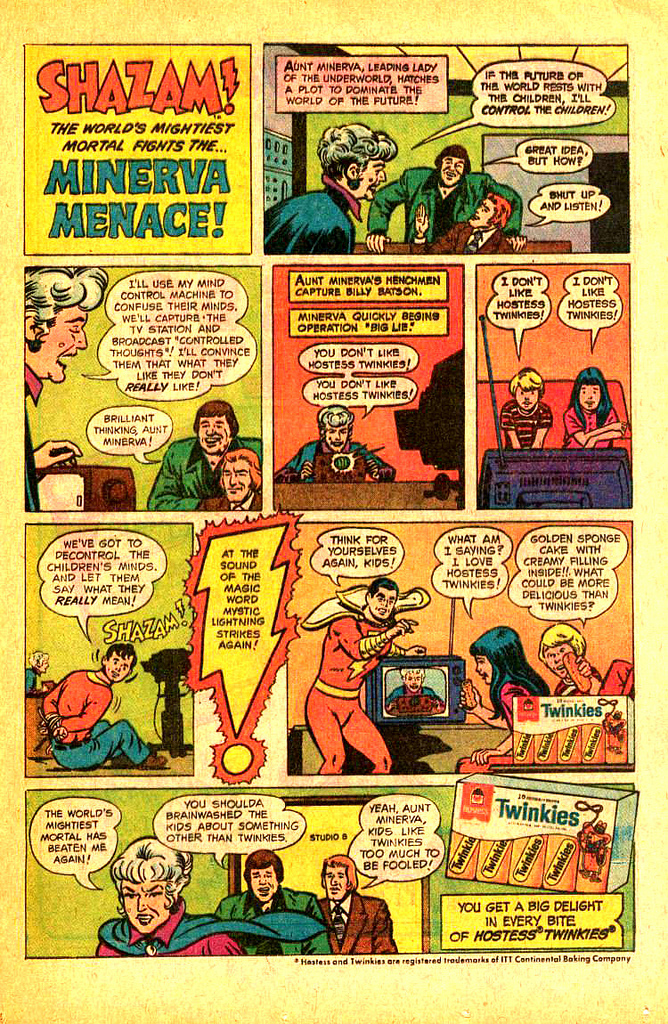To follow in the gargantuan footsteps of Barzun’s seminal (not to mention semeinal) work on the significance — and I use the word in its strictest structuralist sense — of the Hostess oeuvre, the immortal From Cupcakes to Chocodiles: The Decade of Difference, seems presumptuous, if not arrogant. And yet, we, the inheritors of the postmodernist tradition, must do more than live in the house we have been willed; we must have the will to climb to the roof, and, using the purchase of perspective, look farther afield than the men who constructed the cupola. “With great power”, noted Mr. Spider Man, psychosexual satrap and arch-foe of June Jitsui and the Twinkie Takers, “comes great responsibility.” We have been granted the awesome power of post-structuralist literary deconstruction; we must accept the huge responsibility this entails. Such is our manifestly manifold manifesto; such is our horrible task. And such, the present volume will attempt to achieve.
Far be it from the author to accuse Barzun of mistakes; I am, after all, tenured. But there are holes in the mosquito netting in which flitting, felonious suckers of blood and meaning may dart in and out; there are gaps in the metalutionary fossil record. Key among them, the Schlüssel that provides an anschluss to our Schloß, is his focus on the socioeconomic at the expense of the political. Much is made in the text of the sexual power dynamic at work in “Archie’s New Girl”, with the landed plutocrat Veronica debasing herself in the role of a scullery-maid for the favors of of the America-surrogate Archie; and the master is at his peak when he floridly and elegantly assails the false environmentalism and quick-fix Establishment hypocrisy of the infamous “That Dirty Beach”. Occassionally he will dabble in the persona-political, as in his justifiably widely-excerpted assault on Captain America and the Red Skull: he laments “the Nazi denatured, the werewolf transformed from a creature of tooth and claw to an ill-tempered cur who threatens only to piddle on your bicentennial cocktail party”. He accurately skewers a generation robbed of history by the failures of its educational system, noting that “untold aeons of theomilitaristic struggle are distilled into a superscripted cheat-sheet that tells the blind generation that ‘the Cosmic Cube can do anything'”, and gravely warns that “the nuclear death machines of the duelling Rock ‘Em-Sock ‘Em Robots of state communism and market capitalism will not be so easily bribed with a snack cake”.
But when it comes to more specific indictments of 20th-century reactionitariansm, the reaver of words falls strangely strangled and mute (moot?). Anent the dynamic labor struggles of Twinkieless Gotham City he has little to say; ignoring the burgeoning bourgeoise class struggle inherent in the tuxedoed aristocrat’s plan to enslave laborers, he focuses instead on the cultural aspect, meta-metaphoring television while revolution lies fallow. Despite the obvious Red Scare overtones and white-flight references of the obviously-titled “The Power of Gold” (“Fighting an invisible enemy has its drawbacks”), Barzun has only this ambigious comment: “The House of Hostess at its most recherché”. And about the charged political dynamite that is “The Flash Meets the Bureauc-Rat”, he says nothing.
But his most obvious exclusion — unlike the Kafkaesque tale of the malevolent paper-pusher or the Stalin stand-in Impercepto, it is not even mentioned in the index — is “The Hulk vs. the Phoomie Goonies”. All the hallmarks of Hostess, ever the vanguard of the imperial guard, posing as the avant-garde, are here: the simultaneous glorification and terror of the civil servant; the revolutionary as enemy rather than as liberator; the easy co-option of revolutionary consciousness by tasty baked goods; the desire of the capitalist state tool to make others pay for the consequences of his own actions, proaieretic and otherwise. The brutish man-child-consumer Hulk is pressed into service to quash leftist liberation, and develops an uncharacteristic waggishness — portraying both a sense of humor and a suspiciously intimate knowledge of governmental regulations — in order to be seen as sheepherder rather than Shiva.
Why this glorification of state violence? Why this twisting of humble peasant pastries into tools of assimilation and baksheesh? Whither the Phoomie Goonies? And why Barzun’s collaborationist cause in callously crushing his communist cavil? These and other vital questions we will attempt to address over the next 875 pages.

